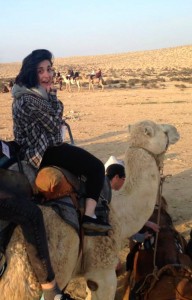By Melissa Maiorella
UMass Public Anthropology Course | Anthro 397D
Spring 2014
Anthropology is one of the most fascinating subjects that one can learn about in college. Learning about different cultures, lifestyles, ideas — it’s what life is about. When I first got to UMass, the idea of an anthropology class really perplexed me. I had no idea what Anthropology even was. It wasn’t until after enrolling in my freshman year Anthro 106 Culture through Film class, that I finally understood. Anthropology is cool!
I often wonder why I hadn’t heard of anthropology sooner. It’s an interesting idea, the study of other cultures, and it’s definitely benefited me to partake in these classes. I feel that I now have a better understanding of the world. I feel not only more knowledgeable about other cultures, but it’s helped me learn more about myself as well. I think that if people took more time to understand the world around them, we could create a better world to live in.
The issue anthropologists face, especially public anthropologists, is engaging the community. In public anthropology, one of the main facets of the work is how to engage a community(ies) that you want to work with, as a way to solve problems and in order to get an idea of what community members think is important. It’s important to get a good perspective on what you wish to study, and the best way to do that, I think, is to get into the heart of it, and really dissect what community members consider to be important and not so important.
Getting insider help and input on social issues is something that can almost always be beneficial to a project. Though having an outsider opinion, or an unbiased view is the best way to observe something, the idea of an unbiased approach is virtually impossible.
For years anthropologists have gained knowledge from insider information. Examples of this can be seen in Udi Mandel Butler‘s chapter ‘Toward a Dialogical Anthropology’ in the edited volume Toward Engaged Anthropology (edited by Sam Beck and Carl Maida, Berghahn Books, 2013). As far back as the early 20th century, American anthropologists and colonial leaders worked together to solve the problems that were occurring within the communities they were studying. Butler goes into detail about different projects that include using information from both sides of the anthropology spectrum. Butler cites the “best selling Brazilian book” Cabeza de Porco, which was written in a collaborative effort between anthropologist Luiz Eduardo Soares, rapper MV Bill and Hip Hop producer Celso Athayde. The topic of this book is the growing issue of drug trafficking throughout Brazil, and the rising power of gang-life in urban areas. By collaborating between academics, as well as those who have lived their lives in these kinds of areas, they were able to paint a more accurate picture, as well as analyze and understand what issues are really forming there.
The most important thing that research like this can bring to light is how it effects the community’s young people. The young people of urban areas in Brazil are the ones who are fueling the gang violence issues. They are being taught at a young age that this is what you need to do to survive, and because of that, don’t ever get the chance to see what the world has to offer, outside of life in a gang. There is no real way out. That’s why education is so important.
Educating students earlier in life about the benefits of anthropology, and how it can be used to help the world, is something that I think is very vital to human existence. If we can get this knowledge into the ‘public’ of public anthropology, I think that we can create an open forum where even the tiniest of change can occur, and create a better environment for the future.
It’s important in anthropology to create a dialogue for all parties who wish to be involved to be able to interact with one another. Rather than telling someone that what their community is doing is wrong, or what’s being done to them is wrong, we must be open to different viewpoints. If we can do this, we can help create a better world to live in, one that’s more open and accepting for all.
Bibliography
Butler, Udi Mandel (2013) Notes on a Dialogical Anthropology, In Toward Engaged Anthropology, edited by S. Beck & C. Maida. New York: Berghahn Books.
